Articles about reggae music, reviews, interviews, reports and more...
Interview: Full Size Chatty With Prince Fatty
- Home
- Articles
- Interviews
- Interview: Full Size Chatty With Prince Fatty

Interview: Full Size Chatty With Prince Fatty
"Music is a fantasy. Like having an affair without upsetting people. Or a horror film where no one dies"
Sampler
“You weren’t followed here?” asks, engineer, entrepreneur and natural mystique-creator Mike Penlanconi AKA Prince Fatty as we enter his hermetically sealed inner chamber, “My competitors have spies in the area”. He’s joking, but his studio The Ironworks in Brighton, England’s “London by the sea” is not well advertised to the uninitiated. It’s an unassuming building on a street of industrial and commercial space – its location only suggested by a large mural for his last, martial arts themed album, 'Prince Fatty Versus The Drunken Gambler' on a nearby corner. The art was sprayed by a graffiti friend Jake who does the covers to Fatty’s retro yet refreshingly irreverent series of ensemble reggae albums – 2007 debut 'Survival of the Fattest', 2010’s 'Supersize Me', 2011’s 'Return of Gringo' and 'Drunken Gambler'. On the sonic side, all four combine a remarkable ear for recreating the sounds of 70s reggae in a bouncily uptempo fashion without a trace of the boringly respectful hagiography you find in some roots music made on the continent. The same applies to collaborations with artists like Little Roy (the daring Nirvana covers collection 'Battle For Seattle') and Hollie Cook, daughter of Paul Cook from the Sex Pistols, who is with him today as they put the final touches to her second album. Deejay and drummer Horseman is due to arrive later but never shows.
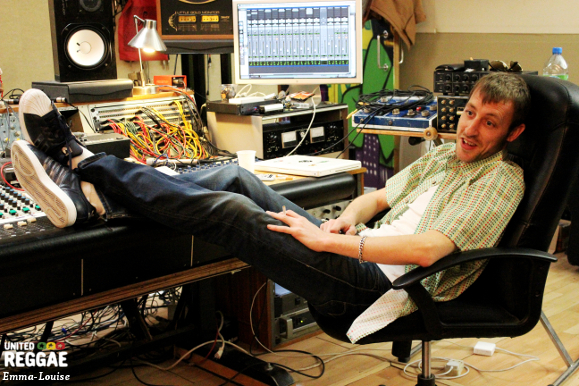
The first room of his studio complex is a private club with its own impressive sound system - including ceiling speakers - that hosts parties on a “strictly random” basis. “Sorry about the mess” he says of some post revelry rubble (“We had a party for his birthday a couple of weeks back” Hollie adds.) We then file into the main room, filled with salvaged vintage ex BBC equipment, some units going back to 1952. Fatty paid for the space with a major label advance (his pre reggae production and engineering credits include pop stars like Lily Allen, hip hop artists Tribe Called Quest and the Pharcyde, and a stint at legendary London imprint Acid Jazz). There are photographs of Miles Davis, Bob Marley and Stevie Wonder, and a signed photo from Ike Turner next to one of Studio 1 veteran Winston Francis (“Good and evil” quips Fatty).
He has asked us here to talk about his plans to start his own subscription based label, having left longstanding associates Mr Bongo Records. He also wants to preview tracks from his forthcoming album with Francis – which he is financing direct via fan fund site PledgeMusic. We hear a dubby relick of Ten Times Sweeter than You with naturally sweetened harmonies by Winston and George Dekker of the Pioneers. Fatty turns up the delay on the familiar “Huuuuuuuuuuuuu” of Big Youth for a recut of Cool Breeze/Stop That Train featuring characterful lead guitar by “a local guy named Max” and worryingly exact replica backup vocals. Of course, there’s a retread of Let’s Go To Zion. “I had to do these” he says of the old material “I am a fan and Winston’s catalogue is spread all over. But we’re gonna do new and obscure tunes. Lick over a couple of soul tunes. Max Romeo says he might get involved”. He describes Winston, who is away doing live PAs with Chris Peckings, as “My favourite male singer. He’s not like other singers. There’s a fine line between loving yourself too much. He doesn’t care. He’s King Cool”.
Francis and Fatty have both enjoyed alter egos. Now it feels like the once mysterious Mike Pelanconi – who used to prefer email interviews – wants to be known. He proudly shows us his custom mountain bike – with illustrations of Haile Selassie and Augustus Pablo. He plays us dubplates of Burning Spear and Mungo’s Hifi which you can only hear at his sound system shows when he, Hollie and Horseman hit the road. He talks about his website Drumdrops where he and Horseman create reggae drumbeats for producers to download. He tells us how, despite his early days as a cassette bootlegger he is disappointed by the widespread availability of music on the internet (“Nothing is special anymore”). He draws a pink vinyl 12” of Johnny Clarke’s Cold I Up on the Blood Dunza rhythm (“Life is full of surprises. I never expected a pink record to be such a hard roots tune”). This leads to how he saw a ghost once in a surprising place. “It wasn’t in a haunted house. It was on a tropical beach in Thailand”. Before we can suggest a sunhat next time he explains there is evidence. “The owner of the resort died. And there he was in two photos my friend took. We were on an island with no access to Photoshop”.
“Sharks are more scary than ghosts” says the man who is distancing himself from the traditional music business “I’m more scared of the physical. Things with teeth. Music is a fantasy. Like having an affair without upsetting people. Or a horror film where no one dies”.
NOW, STOP, MAKE YOURSELF A STRONG ITALIAN COFFEE AND READ THE FULLY FATTY CHATTY…
First I ask him about the building we are in. He is unsure of its history.
I know it was an ironworks. It’s about the only solid building in Brighton. The rest is like a shanty town. Before it was an empty warehouse. I designed the control space. It’s all acoustically worked out to NASA spec with a metre’s sound installation and treatment. If you want bass you need solid floors. You need height as well so I have three metres. The combination is what you want.
Reggae musicians often bemoan how no one plays together in a room while recording. Does he get back to that here?
90% of what we do is like that. And if the singer’s around, even better! Because otherwise we end up doing it in the wrong key and have to do it again!
(at this point Horseman phones and says he is going to be late. “He’s on yard time” says Fatty)
There’s some serious equipment in here.
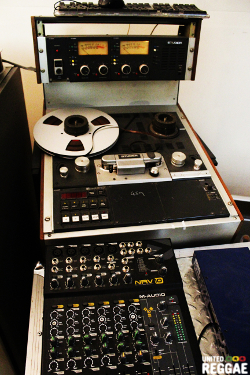 I’ve had this shit for years. All I’ve ever done is recorded and hustled to build my studio. I got lucky in the mid to late 90s when the BBC started to get rid of their stuff. Those tape machines are crazy. That’s a proper Ampex M1200 like at Channel One. That’s a Valve Studer 2 track machine from the mid-60s like Studio 1. A lot of people think the Jamaicans had low budget equipment because of Lee Perry’s more low fi productions. They might have been shoddy with presentation and the labels weren’t always centred on the vinyls but the microphones and desks were top of the range American.
I’ve had this shit for years. All I’ve ever done is recorded and hustled to build my studio. I got lucky in the mid to late 90s when the BBC started to get rid of their stuff. Those tape machines are crazy. That’s a proper Ampex M1200 like at Channel One. That’s a Valve Studer 2 track machine from the mid-60s like Studio 1. A lot of people think the Jamaicans had low budget equipment because of Lee Perry’s more low fi productions. They might have been shoddy with presentation and the labels weren’t always centred on the vinyls but the microphones and desks were top of the range American.
This place is not easy to find. Is he trying to avoid Brighton’s thousands of bands proffering demos?
We don’t advertise. I do hire the studio out but there’s a lengthy selection process right Hollie? We make it as difficult as possible for clients so we have more time to make our own music. Clients are a pain in the ass but occasionally we need their money to fund things. The music business is boring. It might as well be McDonalds. Occasionally I flip burgers.
The Mr Bongo thing is over, and Prince Fatty is expanding on his own?
My contract ended so I’m a free agent. I’m a lot of trouble to have on the books! I’m finishing the work we still have to do. Hollie’s album. Winston Francis’ album’s on the can. Hopefully with the Pledge we can get that done. From there I’m going to launch my own record label. Digital’s going to get taken care of digitally but anyone who wants new Prince Fatty stuff on vinyl is going to have to subscribe. I can’t get involved with distribution. There are key shops we have great relationships with that we’re going to support. But I want to go into a subscription vibes. Also bring in other sounds. Reggae is just one side of it. I like Afrobeat, disco, I have a hip-hop background. I grew up listening to those all at once. Fela and the Meters are as important to me as Burning Spear.
 The music business is boring. It might as well be McDonalds. Occasionally I flip burgers
The music business is boring. It might as well be McDonalds. Occasionally I flip burgers
But of course. If you only like reggae you don’t really like reggae. He listens to Cumbia as well?
I love all that. The Fuentes labels are awesome. It’s an equatorial ambition I’ve got. The equator is what I want.
You want to put your arms around the world? He sounds unsure about this. He starts to talk like a gangster.
Yeah kind of. It’s where I’ve set my compass. Capiche?
What ambitions are there for this label? Where is it going to sit in UK founded reggae label history?
Mostly when I’ve wanted to do things people said “no no no”. My label’s going to be “yes yes yes”. It’s just about the music. I don’t care if the singers are cross-eyed. Or if people are old or young – so long as they are over 18. People make music for different reasons. My thing is from the clubs. I love the sound system thing. The party vibes. My idol ambitions-wise? I want to be the Afrika Bambaataa of reggae. With a bit of P Funk thrown in.
 Mostly when I've wanted to do things people said "no no no". My label's going to be "yes yes yes"
Mostly when I've wanted to do things people said "no no no". My label's going to be "yes yes yes"
Fatty plays some new tracks from Hollie’s album and a dubplate of her covering Kraftwork’s The Model that sounds like Twinkle Brothers’ Never Get Burn. How is the new album going? When’s it coming out?
It’s done dude. I think we’re there. No one can touch us as far as lovers rock and disco combinations go! We’ll see how the people take it. We’ve been playing tracks out and I think it’s going to go down nicely. It’ll be out sometime from September. The album before, Hollie and I met, started recording and there was no real strategy. But we never stopped either so it’s not like this album’s been knocked out in three weeks. It’s three years’ work, probably. Lots of masters cut, we’ve dumped loads of songs, looking for perfection. Or imperfection sometimes! To find the little stubborn runts that we like.
(Hollie laughs)
The selection of musicians has been very specific. People like Dub Judah on bass.
Dub Judah, that explains the Twinkle Brothers connection. He’s an artist with a very distinctive nasal voice. But those who know say he has more to him vocally than that.
He’s my minister of dub. He’s in the camp so to speak. Like you say, he’s got his own Dub Judah style but he’s got a full range voice. Dub Judah’s off the wall. A very unique, original human being. Consciously he is a very warm guy. Inspirational and calming.
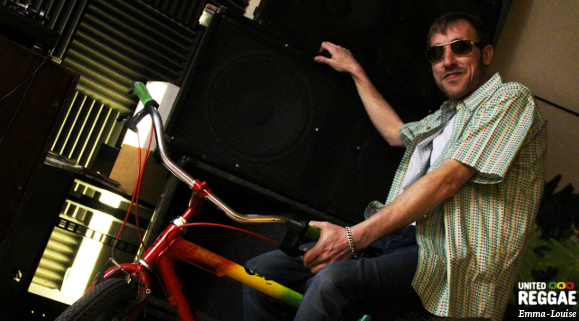
Another beloved figure is of course, Winston Francis. His album is clearly a special project. His picture is on the wall with Stevie, Bob, Ike and Miles. How did Fatty decide to use PledgeMusic to fund his record and is this the way forward?
A couple of bands I work with have used it. The Skints and the Meow Meows. I was impressed by how they managed to raise funds and record how they wanted without having to get any third parties in like a label or some grease-ball manager! So I thought I’d see if it could work for us. It’s too early to say because it’s only just started but hopefully with a bit of support it will come through.
Winston’s been a victim of the music business machine. His records are everywhere. He’s had deals with different companies. So I thought it would be nice if we could do it ourselves and not worry about the old fashioned way. We’re trying to be as modern as we can!
I ask him how Big Youth got involved.
Big Youth is awesome. He’s possibly my favourite mc. Original, dynamic guy. When he was here I approached him and said “I really wanna do this”. I didn’t realise Winston is one of Big Youth’s favourite singers so he was all over it! Everyone loves Winston. We’ve got Max Romeo getting involved, Big Youth, George Dekker’s doing the BVs. We’ve got a nice vibes.
People assume from the name Prince Fatty that he wants to be the next King Tubby. Certainly both are engineers who were front of house, so to speak.
I just wanted to make records, period. People talk about the engineering and technical side of what Tubby did but his arrangements are wonderful. Very simple rhythms rearranged in a clever way that makes them interesting again. He overdubbed some very small things and transformed them into new pieces of music, new atmospheres and new songs, almost. From that side he’s untouchable.
But he didn’t produce or write the music. People brought him the best rhythms and he chose and did his thing. A lot of talented people were part of that process. Bands like the Aggrovators. So it’s all relative.
He also dispels the notion that Tubby stands above all else in his inner reggae universe.
There’s Tubby of course – but Junjo Lawes is the one for me. Of all of them Junjo I probably respect the most. He was revitalising old singers that were dead and buried by coming through with some fresh stuff. He was discovering new artists, building new rhythm sections and heavy sounds with proper quality control.
 There's Tubby of course – but Junjo Lawes is the one for me
There's Tubby of course – but Junjo Lawes is the one for me
He’s anticipated my next question about Tubbys not being a writer. Musicians since the 60s have tried to control publishing but Fatty works with writers like Barthélémy Corbelet. How much does he rely on others?
Once you’ve got an idea you’ve got to get the right people in to make it work. A casting vibe if you like. So generally, for the different moods we want I just bring in the different crew. We have our French friend, Bart, who is very eclectic and in his own pocket. Some songs have been co-written with him. Some songs, me and Hollie have done. Others Dennis Bovell, Winston Francis and Hollie got together. The thing is, where the songs come from, I don’t really care. Generally whoever is involved in contributing to the material gets involved. It’s not like we’re going to songwriters and publishing companies or people are sitting down at the piano writing songs. That’s 60s stuff. The process is more random than that. It can just be a drumbeat that sparks it. Sometimes I send Hollie a really crappy beat on a drum machine…
(Hollie says “And I’ll send back a really crappy vocal!”)
And “boom”. We trade ideas. Sometimes I forget how they even started. In here it’s like a constant whirlwind. So what started as an influence by the end can have no resemblance. I can pull out an old Brazillian record I find inspiring and it’s just a mood.
It becomes clear we’re going to miss Horseman so we talk about the veteran UK toaster who amazes in Hollie’s touring band when he deejays and drums at the same time. We listen to a couple of tracks from his forthcoming album. When’s it coming?
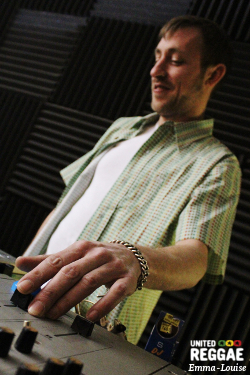 We’ve been working on it. Horseman is a phenomenal and fundamental talent. Music is one of the things that with age, if you’re wise and you work, you get more powerful. The guy’s a walking talking reggae encyclopaedia and rhythm making machine. He knows every song, all the different versions so when we’re communicating in studio it’s a different level. I can literally reference him to a rhythm section or musician or a certain version feel. “Do that one in a Sly Dunbar or do that one in a Roots Radics” “Give me a Carlton Barrett” and he’ll do the drumfills just like how Carlton used to do it. That’s how detailed he is.
We’ve been working on it. Horseman is a phenomenal and fundamental talent. Music is one of the things that with age, if you’re wise and you work, you get more powerful. The guy’s a walking talking reggae encyclopaedia and rhythm making machine. He knows every song, all the different versions so when we’re communicating in studio it’s a different level. I can literally reference him to a rhythm section or musician or a certain version feel. “Do that one in a Sly Dunbar or do that one in a Roots Radics” “Give me a Carlton Barrett” and he’ll do the drumfills just like how Carlton used to do it. That’s how detailed he is.
He digresses to some personal territory that’s interesting – especially if you thought his love of vintage sounds meant he was precious about reggae.
Not to sound disrespectful, but when I’ve done my own versions I’m almost using their original as a demo. To me things can always be improved. So it could be: the song’s beautiful but they cut it a bit too slow? By speeding it up I can get a little more bounce? I don’t really care for the politics or sacrilege. I don’t have any emotional attachment to things like that. In the end the things I do, I’m making for myself. That’s primarily who I’m trying to please.
Does he feel more comfortable talking about himself these days? Is Mike Pelanconi wanting to be known as much as Prince Fatty?
Yeah. No. Yeah. It’s not like I get into an outfit. People have been disappointed because by the time they met me they’d already made loads of assumptions. If something has a certain quality to it they might presume you’re of a certain background. If I see a black person in an orchestra I don’t go “Jesus, there’s a brother playing the cello”. I’ve had white people come up to me and be disappointed. We’re setting up the sound and they ask Horseman “Are you Prince Fatty? And he says “No that’s him there”. And they’re looking at me like I’m a leper. It’s right on their face.
It’s a shame people narrow off their experiences. “I only listen to stuff pressed in Jamaica” or “I only listen to hip hop from New York”. I understand but you can’t close off because there’s many surprises that are nice. The best reggae I’ve heard is all made outside of Jamaica. Reggae, like hip hop, has been marginalised so I’m trying to bring this back for normal people. I don’t really care about hardcore reggae fans.
 I'm trying to bring this back for normal people. I don't really care about hardcore reggae fans
I'm trying to bring this back for normal people. I don't really care about hardcore reggae fans
He’s got a point. Go on any reggae forum and you’d be pressed – whether Jamaican, UK or US issue – to call hardcore fans normal.
I don’t want loads of stoned guys coming to see us. When we play out girls flash their boobs at us. When I play Wet Dream and we’re in the right place, it goes nuts. I don’t know what made those two girls in Croatia do it! The other night in Berlin I dropped my version of Linval Thompson Marijuana and everyone just lit up. The club just filled up with smoke. Horseman was like “Yow, that’s dangerous!” Those are the reactions I like. So I want to step out of the whole reggae thing. It’s like if rock and roll had been taken over by Jehovah’s Witnesses? Reggae got hijacked and they assume for you to do this you’ve got to sing about Babylon. That’s not my battle.
As Fatty’s opening up about quite unusual subjects I raise an elephantine topic that’s been on my mind for two years. His Nirvana covers album with Little Roy and Nick “Mutant HiFi” Coplove, Battle for Seattle is one of my favourites, because it takes his vintage sound and pairs it with material that creates something totally new.
I saw Nirvana when I was 17 at the Astoria a few days after their famous Word appearance on TV. I didn’t know about them at the time. My friend said there was a band paying that night and I should come. It blew my mind. I never liked the records so much because they were too over produced for me. But live they were phenomenal. It was one of the best gigs I’ve ever seen.
Everyone said “It’s impossible. You’ll never do it”. What inspired me was I heard the unplugged version when I was out one time and because of the noise in the place all I could hear was the voice and the picking that was coming through on the guitar. I started imagining the chop and I was like “Yeah we can do this”.
Little Roy had never heard Nirvana and that made it special because he never had any of the associations or mind issues with it. He didn’t know the guy was a crazy junkie. To him they were just songs. But the real genius of the project was in Mutant Hifi’s conversion of the arrangements. He’s very clever with chords. To make the same melodies work under a reggae bass is not easy to do.
In 2011 Little Roy told me Battle For Seattle was the album that could take him to the mainstream success he deserved. Then suddenly he said he was not working with Fatty any more. Fatty’s side of the story is strangely reminiscent of Kurt Cobain in some ways.
I was conscious that I didn’t want it to be a gimmick. Little Roy’s a wonderful songwriter whose been done over by greats like Freddie McGregor, John Holt. So I wanted the thing to be done with good taste. In the end my issue wasn’t with Little Roy per se but with the company releasing it [Ark]. The commercial strategies they wanted to start putting in. So I said “I don’t want to be involved”. I thought that was the diplomatic way out. With hindsight maybe I could have handled things differently but I felt the best way was to pull back and let them do their thing. I was very happy for Little Roy having the success. I just didn’t really like the vision.
 I was very happy for Little Roy having the success. I just didn't really like the vision
I was very happy for Little Roy having the success. I just didn't really like the vision
I think in music sometimes people get a bit intoxicated by the attention. There was a lot of attention around that record and it’s a shame with the vibes… we didn’t quite get it right. For me personally, a dear friend committed suicide and I wasn’t in a good place. So because of that I think the mixes and versions the record company insisted on releasing were the really boring ones. I’d done really bouncy dubs so I think we missed a trick. There were moments. We caught the version of Dive which is pretty heavy. I think we turned a lot of people on to reggae that weren’t into reggae. But I don’t think we were quite as successful at turning on the reggae crowd.
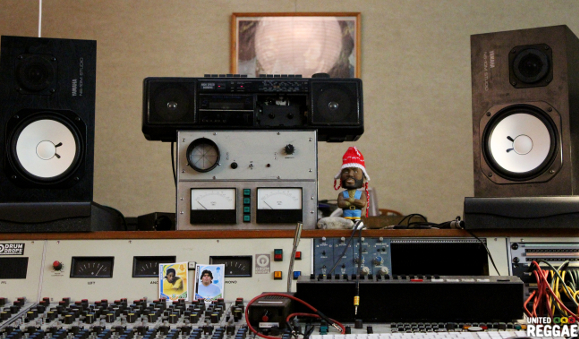
We’ve all heard the press release story about Prince Fatty forming for the 25th anniversary of Stussy in 2005 – what really made Mike create him?
Again there was never a plan. I’ve been recording reggae a long time, and I didn’t imagine people would like what we did. That’s the most inspirational thing. The last 18 months when we’ve gone out we’ve ripped it up. We’ve done festivals with 12,000 people jiving for hours when it’s turntables Hollie and Horseman and that’s it. No fireworks, no lights, no video screen shit. Just raw music. People have criticised us for that. “It’s like you’re having a party at home!” No shit dude. I don’t know what they want. For us to land in spaceships like Parliament. If I had a spaceship I would!
Fatty likes to test new music once a month at Brighton pub the Fortune Of War on the seafront. How does being a selector and creating music intersect for him?
If we can’t play it out it goes in the “interesting” pile. You can have a box of tunes at home and think “That’s cool” but when you’re in the heat of the moment it’s different. So in studio we approach albums the same way. Yesterday me and Hollie were doing the running order for her album - it was like Hollie was DJing her own songs. How does this one mix into that one? We share the same kind of ruthlessness. We make the rhythms, test them and see how it works.
 We are totally free in here. We do what we want
We are totally free in here. We do what we want
So does he sift through the “interesting” pile at night thinking “When is society going to be ready for this?” (He laughs)
That’s the next Prince Fatty album my friend.
Is there a working title?
I’m waiting for Jake, the guy that does all my covers. He might as well be one of the band. I’m waiting for some of the images to come back from him before I really set my mind on it. But you’re going to be well surprised! I’ve been bringing back the P Funk with the reggae.
It’s a question of freedom. We are totally free in here. We do what we want. These are the most expensive reggae records ever made. Time is unlimited. I made this place so we can work and not be confined to normal parameters. So long as we’ve got a bit of discipline to finish an album every three years it’s ok. TO BE CONTINUED…
Read more about this topic
Comments actually desactivated due to too much spams
Browse by categories
Recommended Articles
Latest articles
Recently addedView all
© 2007-2026 United Reggae. All Rights Reserved. Reproduction in whole or in part is prohibited. Read about copyright
Terms of use | About us | Contact us | Authors | Newsletter | A-Z










































































